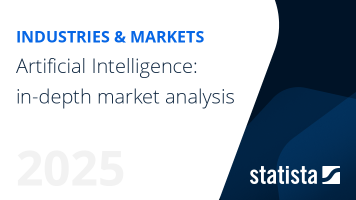AI Robotics - Europe
Europe- The market size in the AI Robotics market is projected to reach US$5.66bn in 2025.
- The market size is expected to show an annual growth rate (CAGR 2025-2031) of 26.44%, resulting in a market volume of US$23.14bn by 2031.
- In global comparison, the largest market size will be United States (US$9.49bn in 2025).
Definition:
Artificial intelligence robotics refers to the field that combines artificial intelligence (AI) and robotics and aims to develop intelligent machines capable of performing tasks autonomously. These robots are equipped with AI algorithms and techniques that enable them to perceive, learn, reason, and make decisions in real time. By integrating AI into robotics, these intelligent machines can adapt to dynamic environments, interact with humans, and carry out complex tasks. These developments pave the way to a wide range of applications in areas such as manufacturing, healthcare, exploration, and assistance, with the goal of enhancing efficiency, productivity, and human-machine collaboration.Structure:
The Artificial Intelligence (AI) Robotics market consists of two components. One of them is AI Service Robotics, which includes the development, manufacturing, and deployment of robotic systems designed for consumer-facing applications. The other one is AI Industrial Robotics, which encompasses the development, manufacturing, and deployment of autonomous machines and robotic systems for use in industrial settings, such as manufacturing plants, warehouses, and logistics operations.
Additional Information:
The market comprises two key performance indicators: market sizes and market sizes by industry. Market sizes are generated by the funding amount of Artificial Intelligence (AI) Robotics companies. Key players of the market include companies such as Boston Dynamics, ABB, and Fanuc.
For more information on the data displayed, use the info button right next to the boxes.
- Service robots such as social robots, cleaning robots
- Industrial robots such as collaborative robots, automated guided vehicles
- Non-artificial Intelligence applications of process automation, such as batch processing and scheduling, which do not involve machine learning or cognitive automation.








